- Home
- Catherine Bateson
Mimi and the Blue Slave
Mimi and the Blue Slave Read online
Mimi and the Blue Slave
CATHERINE BATESON writes poetry, verse novels and novels for both younger readers and young adults. She has won the Children’s Book Council of Australia Book of the Year Award for Younger Readers twice – with Rain May and Captain Daniel and Being Bee.Rain May and Captain Daniel also won the Queensland Premier’s Literary Award. Three of her other novels, The Wish Pony,Painted Love Letters and Millie and the Night Heron, were CBCA Honour Books. Millie and the Night Heron was shortlisted for the YABBA and KOALA children’s choice awards.
Catherine lives in the Dandenongs, near Melbourne, with her husband, her son and daughter and her youngest step-daughter, a labrador, a terrier and assorted tropical fish. She works as a writer in schools and teaches Professional Writing and Editing at TAFE.
Also by Catherine Bateson
For Younger Readers
Rain May and Captain Daniel
Millie and the Night Heron
Being Bee
The Wish Pony
Magenta McPhee
Hanging Out
For Young Adults
A Dangerous Girl
The Year It All Happened
Painted Love Letters
The Airdancer of Glass
His Name in Fire
Poetry
The Vigilant Heart
Marriage for Beginners
All rights reserved. No part of this book may be reproduced or transmitted by any person or entity, including internet search engines or retailers, in any form or by any means, electronic or mechanical, including printing, photocopying (except under the statutory exceptions provisions of the Australian Copyright Act 1968), recording, scanning or by any information storage and retrieval system without the prior written permission of Random House Australia. Any unauthorised distribution or use of this text may be a direct infringement of the author’s and publisher’s rights and those responsible may be liable in law accordingly.
Mimi and the Blue Slave
ePub ISBN 9781742741109
Kindle ISBN 9781742741116
A Woolshed Press book
Published by Random House Australia Pty Ltd
Level 3, 100 Pacific Highway, North Sydney NSW 2060
www.randomhouse.com.au
First published by Woolshed Press in 2010
Copyright © Catherine Bateson 2010
The moral right of the author has been asserted.
Woolshed Press is a trademark of Random House Australia Pty Ltd. All rights reserved.
www.woolshedpress.com.au
All rights reserved. No part of this book may be reproduced or transmitted by any person or entity, including internet search engines or retailers, in any form or by any means, electronic or mechanical, including photocopying (except under the statutory exceptions provisions of the Australian Copyright Act 1968), recording, scanning or by any information storage and retrieval system without the prior written permission of Random House Australia.
Addresses for companies within the Random House Group can be found at www.randomhouse.com.au/offices
National Library of Australia
Cataloguing-in-Publication Entry
Author: Bateson, Catherine
Title: Mimi and the blue slave/Catherine Bateson
ISBN: 978 1 86471 994 9 (pbk.)
Target audience: For children
Dewey number: A823.3
Cover illustration by Sonia Kretschmar
Cover design by Mathematics, www.xy-1.com
Typeset in Minion by Midland Typesetters, Australia
Printed in Australia by Griffin Press, an accredited ISO AS/NZS 14001:2004 Environmental Management System printer
10 9 8 7 6 5 4 3 2 1
Table of Contents
Cover
About the Author
By the Same Author
Title Page
Copyright
Shipwrecked
The Funeral
All the Little Tears
Fish Bones, Whale Skeletons and Sailors’ Skulls
The Long Ride Home
Pirate Books, Strawberries and Jealousy
Treasure Island
Queen of the Creaking Seas
Breathing
Revised Opening Hours Due to Heartache
Shopping with Edie
Marcasite, Milk Glass and Fate
Pippi
Meeting Troy
The Best Idea Ever
The Rude Wind’s Old Lament
Collect them all!
Two days before my father’s funeral I came down with such bad flu that Mum got the doctor to make a house call.
‘That’s ridiculous, Lou. It’s spring,’ Aunty Ann said. ‘As if she can’t be bundled into the car.’
‘It’s raining,’ Mum said, ‘and her temperature’s through the roof.’
‘We really don’t need this now,’ Aunty Ann said.
‘Her body is manifesting her spiritual grief,’ Aunty Marita said. ‘There’s nothing you can do, Lou. Just let it run its course. Grief has to do that.’
‘It might be manifested grief,’ Mum replied. ‘I’m not taking any chances. It could just as easily turn into pneumonia. Mimi’s always had a weak chest.’
‘You do what you have to do, Lou. We’re here to support you, aren’t we, Ann?’
‘We’re not here to see her make a fool of herself. What doctor does house calls for the flu these days?’
Doctor Phillips did make the house call, however. He listened to my chest with his stethoscope, took my temperature and sighed.
‘Flu,’ he said. ‘Bed rest. There’s a bad strain going around, Louisa. I’m sorry this has happened right on the heels of Doug passing away.’
‘Will she be able to go to the funeral?’ Mum asked, ‘if she keeps warm? It’s so important, Doctor.’
He nodded. ‘I don’t see why not. Children are very resilient. Now, how are you? Do you need more sleeping tablets? I can write you out a script now, you know.’
I didn’t want to go to the funeral. I’d never been to one before and now my first one was going to be Dad’s. It wasn’t fair. I thought you should be able to practise funerals, starting with people you didn’t know well – distant aunts and uncles, perhaps. They should all be old, too.
My dad hadn’t been old and now he was dead and lying in a wooden box. The thought made my head spin. I shut my eyes against the room going around, but the flickery red lights spun behind my lids anyway. Maybe I’d be so sick in two days’ time that Doctor Phillips would have to be called again and he’d say gravely, holding his long cool fingers against my forehead, that no, I wasn’t to risk getting up, but would have to stay in bed until everything was over.
By the time I could get up Mum would have stopped crying, the aunts would have gone back to their own lives and I could go back to school as though nothing had happened.
‘You have to eat something,’ Mum said, bringing a tray into my room. ‘Please, Mimi? Soup?’
I turned my head to the wall. My throat was swollen and every swallow hurt. My head ached and my eyes felt as though they’d shrunk to small slits that could hardly see the wavering world.
‘I know,’ Mum said, ‘I know. But just for me, just a little bit?’
I drank two spoonfuls. It was chicken soup – Aunty Marita’s chicken soup. I could tell from the herby ta
ste. Aunty Ann’s chicken soup was thick with celery and carrots. Aunty Marita used so many fresh herbs the soup was specked with green bits. She chopped the herbs with a mezzaluna. I liked the word mezzaluna, which had something to do with the moon.
‘Delicious?’ Mum smiled as though her face wasn’t stretched with tiredness and the bags underneath her eyes weren’t creased down to her cheekbones. The smile spread thinly across her face, but her eyes stayed anxious.
I couldn’t talk. My throat hurt too much, so I nodded but didn’t eat any more. I drank some fizzy water through a straw and then flopped back on the pillows that were piled up too high so I wouldn’t cough through the night.
I still coughed, though. I coughed under the covers so Mum wouldn’t hear me and come in with hot lemon drinks or cough mixture or spoonfuls of honey. I coughed into my hands until they were wet with my breath. I coughed into the top pillow with the pale blue swallows flying across it until there were damp patches on it. Then I turned it over and coughed into the other side.
Any movement I made blasted ripples of cold air through the bedclothes and across my skin. To warm up again, I’d have to lie very still after I coughed. Only my face stayed hot. Then, later, the rest of me burnt up so I had to lift one arm carefully out from under the blankets to air it until I got cold again.
I couldn’t sleep.
I didn’t want to think about Dad so I told myself stories instead .
I imagined I was a pirate queen wearing a tattered dress and a man’s waistcoat, like the waistcoat my father wore on special occasions. I pinned a big brooch to it and pulled a locket on over my head. In it was a portrait of my one true love. But I would never open it for anyone. I tied my long hair up in a raggedy bun and sailed over the ocean following a silver dolphin to an island where there was buried treasure.
My blue slave came with me. He was the only one of my crew I trusted with my life. Unlike the other crew members he was clean-shaven. His face and his upper arms were tattooed with blue waves. Some would have found them ugly, but to me they were just part of who he was, as my tangled, salt-thick hair was part of me.
I never reached the island, so maybe I did fall asleep.
When my eyes opened it was the morning of my father’s funeral. My throat had completely closed over and as I breathed I could hear pops and rattles. My hair stuck to my burning forehead. I tried to get up but I was dizzy so I sat back down on the bed and waited for Mum to come in and tell me what to wear.
You have to wear black at funerals. Or dark colours. Everyone knows that, but Mum wasn’t obeying the rules. She came in wearing her red lace dress. At least she’d put it on over a pair of black leggings. She wore her high-heeled shoes, even though she hated walking in them. She’d put on dark lipstick, too, so her mouth was a slash of colour on her pale face. She’d left her hair down. Dad had loved her hair. He would sit at night sometimes and stroke it, as though it were a cat.
I wanted to tell her how beautiful she looked, but no words came out. They were trapped under my swollen throat.
‘How are you then?’ Mum said, putting her hand on my forehead. ‘That’s a temperature all right. Are you okay?’
I shrugged and shook my head.
‘Don’t tell me you’ve lost your voice as well?’
I shrugged again. I could hardly tell her I had lost my voice.
‘She’s lost her voice,’ Mum said to Aunty Ann who’d followed her into my room. Aunty Ann wore all black. You could count on her to do the right thing.
‘Never mind,’ Aunty Ann said, ‘she wasn’t going to say the eulogy or anything.’
‘No, but...’
‘Well, that’s okay then. Hop up, Mimi, and we’ll find you something to wear. Something suitable.’
I couldn’t hop up, but I managed to stand. I think Aunty Ann scared away the germs that danced in my head, making me dizzy.
‘Has this child got a dress?’ Aunty Ann demanded.
‘She mainly wears jeans,’ Mum said. ‘That’s what kids wear these days.’
‘We should have thought of this sooner,’ Aunty Ann said. ‘We could have at least got her a good frock.’
‘She couldn’t have gone shopping,’ Mum objected. ‘She’s been sick. We’ve been busy.’
‘Only because you insisted on writing the eulogy yourself. If you could have just had a normal funeral, Louisa, we’d have had time to think about everything else.’
I didn’t want them to fight again so I dragged open the bottom drawer of the chest of drawers and showed Aunty Ann my good long skirt. I’d only worn it once. It had pink, red and orange flounces, but it was a skirt. Aunty Ann raised her eyebrows at the colours.
‘Well, you’ll match your mother,’ she said finally. ‘I suppose this will have to do.’
‘We’re not in the Victorian era anymore,’ my mother said sternly. ‘Doug loved colour, Ann. He’d totally approve. Why do you think I’m wearing this dress?’ Her chin shook and I knew she’d cry any minute. Aunty Ann knew too, and she bit her top lip.
‘Sorry, Lou,’ she said and stroked Mum’s hair. ‘Sorry. You know what I’m like. I’m just a conservative old stick-in-the-mud, aren’t I?’
I nodded in agreement until Mum glared at me.
‘You like things to be the way they should be,’ Mum said, ‘and that’s okay. But this is going to run the way I want it to.’
‘I know, it’s your funeral, Lou, you should do what you want. I mean, it’s not your funeral, but – oh, you know what I mean. Sorry.’
I helped Aunty Ann find the black T-shirt top that looked good with my flouncey skirt and even let her find some old winter tights for me.
‘You look gorgeous,’ Mum said, ‘if fluey.’
Aunty Marita was at the breakfast table. She was drinking a glass of thick green stuff.
‘How are you this morning?’ she asked me.
‘She’s lost her voice,’ Mum said.
‘You should really give her some of this.’ Aunty Marita waved the glass at us both. ‘It’ll boost that immune system.’
‘I thought it was grief that was making her sick,’ Aunty Ann said, narrowing her eyes at the muck in the glass.
‘The immune system is devastated by everything that goes on in our lives,’ Aunty Marita said. ‘It’s like a bio-indicator of our emotional health. When you don’t get sick, you know your emotional health is thriving. I rarely get sick.’
Aunty Ann snorted and poured a cup of tea.
‘I think those antibiotics will kick in soon,’ Mum said. ‘We might save that parsley-whatever mix for another day. I’m not sure she could stomach it the way she’s feeling at the moment. We don’t want her throwing up at the funeral, do we?’
Aunty Marita looked unconvinced, but I was relieved.
It was weird the way they all kept saying the funeral, not Doug’s funeral. It was as though he had nothing to do with it, although he’d made it happen.
Mum made me a banana smoothie with honey which oozed down my throat. Aunty Marita sat beside me, keeping one arm around me as I drank it. She wore head-to-foot purple, beginning with a purple head wrap and ending with a pair of purple boots. I fingered the amethyst bracelet on her wrist.
‘Amethysts,’ she told me, ‘focus healing energy.’
I knew the names of lots of stones, but not what they did. I wanted to ask Aunty Marita what lapis lazuli did. They were the stones Ableth, my blue slave, wore. He had a silver hoop through one ear, too. I’d given him that. I thought about the other stones I knew – amber, opal, ruby, garnet, and cat’s eye agate. Dad had said that although it was always the big names that got all the publicity, the semi-precious stones were just as, if not more, beautiful. A lump of lapis lazuli, as blue as a child’s eyes, was part of the earth it had come from. The fire of a sapphire, however pure, could be imitated by science.
�
��What would you rather have?’ he’d asked. ‘A chunk of blue, large enough to set your mind sailing, or a piece of pretty glass?’
Cultured pearls, he said, were just that. Cultured, mannered, sedate. He liked the misshapen ones that dangled from a pirate’s ear. They were called baroque pearls. I liked seed pearls because it was as though they had never grown up.
I didn’t want to think about Dad. I tried to think about my blue slave instead. He would be sitting with his back against the bulwark of the ship reading a book. He was able to read because before he’d become my slave he’d been something high-up in his own country. Not a prince, exactly, but someone to be reckoned with.
I had been reading when my father died. I was supposed to be asleep, but I’d been so close to the end of the book and it was so good that I’d taken the torch from the top drawer of the hallway stand and used that as my light. It was Mum’s window night, so I knew it would be ages before she checked on me.
We live above a shop – a furniture and bric-a-brac shop that also has a small café. Every Friday night, after the Thursday auctions, Mum changes the window display. Sometimes it’s just to add a pretty cup and saucer set, or a box of old fish knives. That’s freshening up the display. Other times she’ll completely pull the old one to bits and start again. That’s dismantling. She likes starting again best, but sometimes doesn’t have the time because she also does a lot of the café cooking.

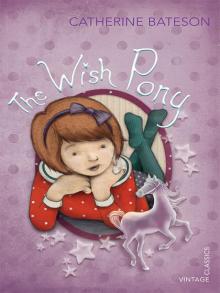 The Wish Pony
The Wish Pony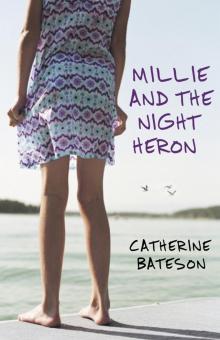 Millie and the Night Heron
Millie and the Night Heron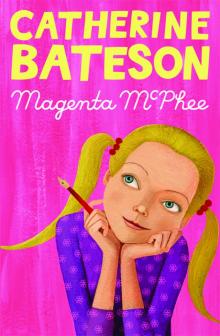 Magenta McPhee
Magenta McPhee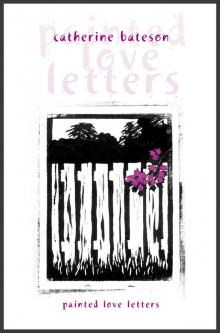 Painted Love Letters
Painted Love Letters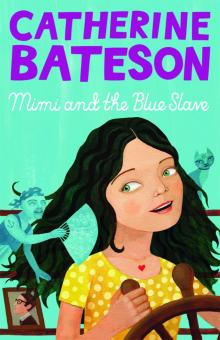 Mimi and the Blue Slave
Mimi and the Blue Slave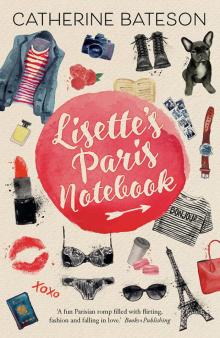 Lisette's Paris Notebook
Lisette's Paris Notebook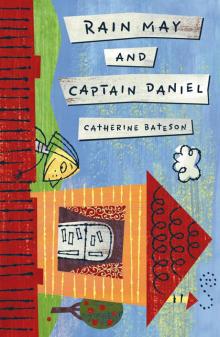 Rain May and Captain Daniel
Rain May and Captain Daniel